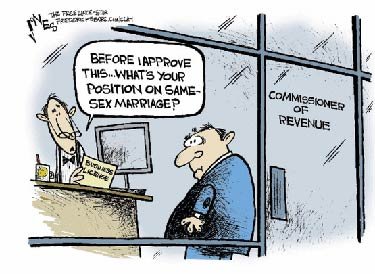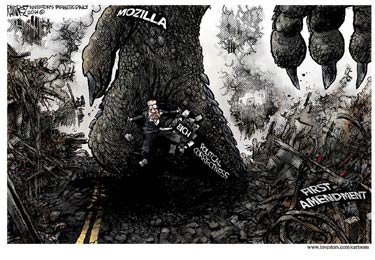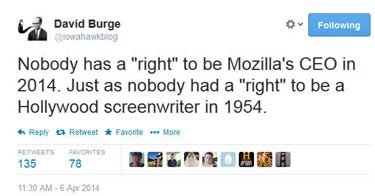The Greengrocer’s Sign
Brendan Eich, Mozilla, Thought Crime, Totalitarianism, Vaclav Havel
Mollie Ziegler Hemingway quotes an essay on totalitarianism by Vaclav Havel in connection with the ouster by Mozilla of CEO Brendan Eich.
[L]et’s revisit an old essay by Vaclav Havel, the Czech playwright, poet, dissident and eventual president. Havel, who died in 2011, was a great man of freedom, if somewhat idiosyncratic in his political views. He was a fierce anti-communist who was also wary of consumerism, a long-time supporter of the Green Party who favored state action against global warming, and a skeptic of ideology who supported civil unions for same-sex couples.
“The Power of the Powerless,†written under a communist regime in 1978, is his landmark essay about dissent. It’s a wonderful read, no matter your political persuasion. It asks everyone to look at how they contribute to totalitarian systems, with no exceptions. It specifically says its message is “a kind of warning to the West,†revealing our own latent tendencies to set aside our moral integrity. Reading it again after the Eich dismissal, I couldn’t help but think of how it applies to our current situation in the States. …
To explain how dissent works, Havel introduced the manager of a hypothetical fruit-and-vegetable shop who places in his window, among the onions and carrots, the slogan: “Workers of the world, unite!†He’s not actually enthusiastic about the sign’s message. It’s just one of the things that people in a post-totalitarian system do even if they “never think about†what it means. He does it because everyone does it. It’s what you do to get along in life and live “in harmony with society.†(For our purposes, you can imagine that slogan is a red equal sign that you put up on your Facebook page.)
The subtext of the grocer’s sign is “I do what I must do. I behave in the manner expected of me.†It protects him from supervisors above and informants below.
Havel is skeptical of ideology. He says that dictatorships can just use raw power, but “the more complex the mechanisms of power become, the larger and more stratified the society they embrace, and the longer they have operated historically … the greater the importance attached to the ideological excuse.†We don’t have a dictatorship, obviously, but we do have complex mechanisms of power and larger and more stratified society.
In any case, individuals need not believe the lies of an ideology so much as behave as though they do, or at least tolerate them in silence or get along with those who work with them. “For by this very fact, individuals confirm the system, fulfill the system, make the system, are the system,†Havel says. …
In the greengrocer scenario, Havel notes that if the text of the sign read “I am afraid and therefore unquestioningly obedient,†he might be embarrassed and ashamed to put it up. The dissidents are the ones who, by refusing to put the sign up, or refusing to recant, shine a huge light on the system, including the ones who go along to get along. All of a sudden those Facebook signs, those reflexive statements, those cries of “Bigot!†look less like shows of strength and more like shows of weakness.
Read the whole thing.








